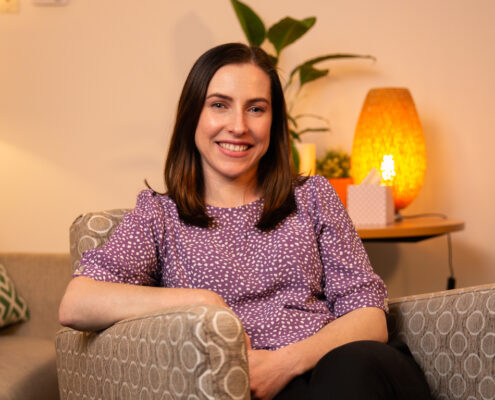Sarah Barclay | Clinical Psychologist
BSc (Hons), MPsych (Clinical), Board Approved Supervisor, MAPS
I am a clinical psychologist with experience working with clients with a variety of presenting concerns. My focus is on creating a safe and collaborative space whereby I use evidence-based therapies to help my clients work towards their specific treatment goals. The interventions I use are predominantly Cognitive Behaviour Therapy (CBT) based including aspects of Acceptance and Commitment Therapy (ACT) and Dialectical Behaviour Therapy (DBT).

Sarah Barclay | Clinical Psychologist
I work with adolescents (15+) and adults seeking assistance for:
- Anxiety
- Depression
- Stress management
- Adjustment and transitions
- Eating disorders
- Body image concerns
- Low self-esteem
- Developinghealthy relationships with food
- Perfectionism
- Grief and loss
- Communication and assertiveness skills
- Emotional adjustment to cancer diagnosis and treatment
- Trauma and Complex Trauma – EMDR (Eye Movement Desensitization and Reprocessing)
In addition to my experience in private practice, I have previously worked in the Monash Health eating disorders team in both the inpatient and day patient programs. I have also worked as a senior clinical psychologist for Eastern Health working with patients of the cancer service.
I am a board approved supervisor and have provided supervision for provisional psychologists and clinical registrars.
An interview with Sarah Barclay
Why did you become a psychologist?
I think I kind of fell into it. I was always interested in neuroscience and in studying that, the more I learned about human behaviour – how we can help people understand themselves better, make changes in their lives and things like that. I became more interested in psychology and I ended up going in that direction.
What are you passionate about in Psychology?
I’ve found it fascinating. I’m passionate about a lot of different things but something I’ve been really focused on is improving people’s relationships with food and their body. I think we often find ourselves in a culture where certain body types are valued and we become overly focused on what we’re eating and things like that. So healing that relationship with food, improving people’s body image and the relationship that they have with their body and with themselves – I think that’s one of the things I find most interesting and exciting.
How do you find satisfaction in the work you do?
It’s a sense of satisfaction in the work when people feel heard and understood and they say, ‘Oh, it makes sense now’ or ‘I thought I was the only one that felt like this’. And they get a sense that they’re not alone. But also, I think there’s satisfaction in the work when people come back and say, ‘Ah, this challenging thing happened in my life and I thought of that thing we talked about in session and I was able to try something different (or apply a new strategy or skill)’. I think that’s a really exciting part of the work.
What can a client expect in their first session?
In the first session, we’ll focus on getting to know what brings the client to therapy, what they’d like to work on and setting some treatment goals together so we’re all on the same page and also getting a bit of background. Also, understanding what’s happened in the client’s life that might have led them to this point or what helped them in the past or coping skills they already have.
